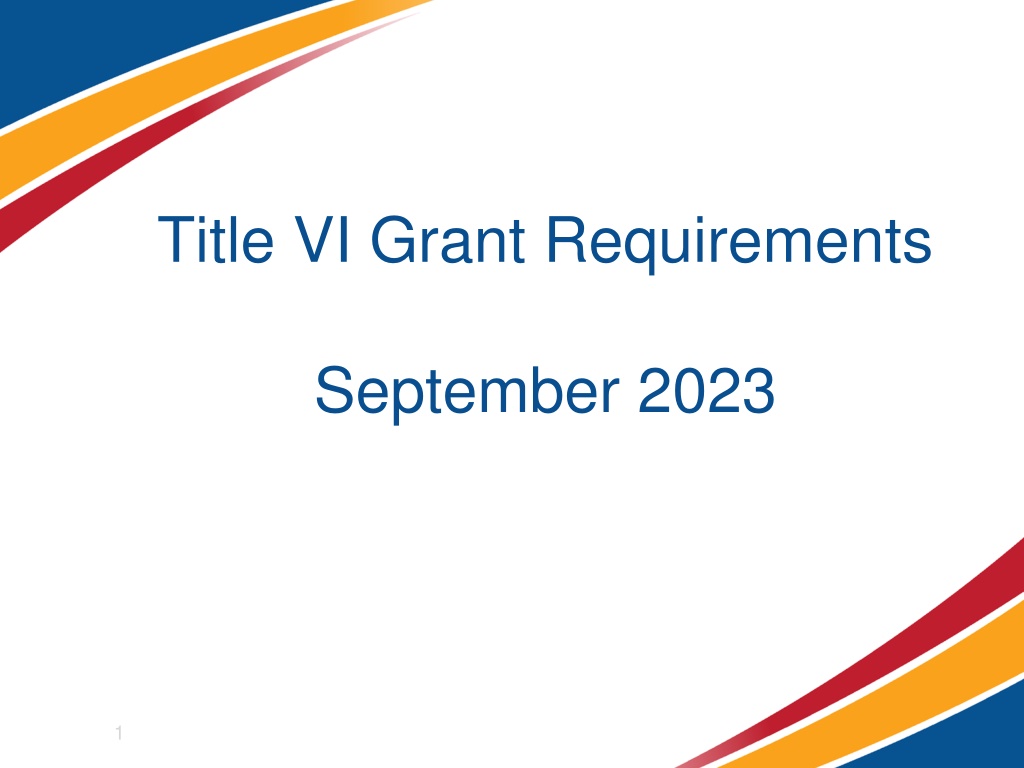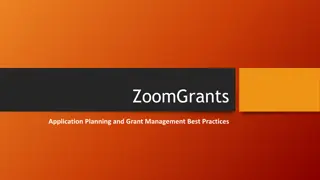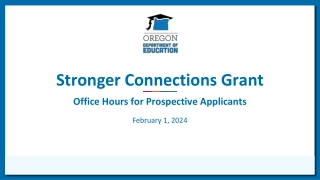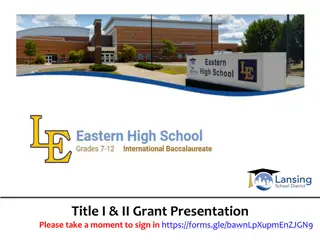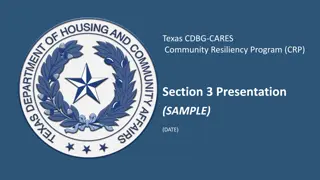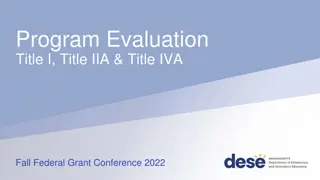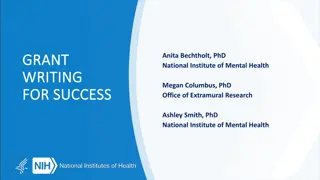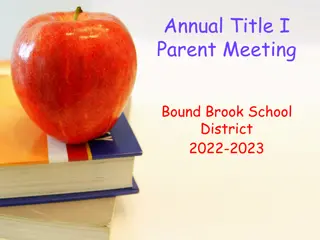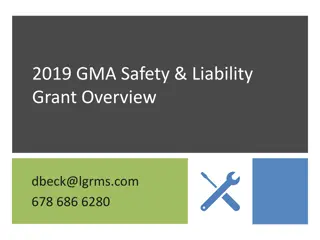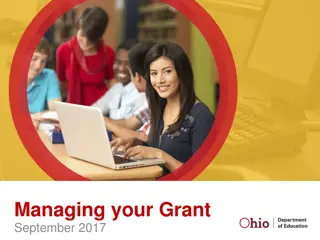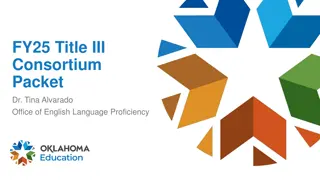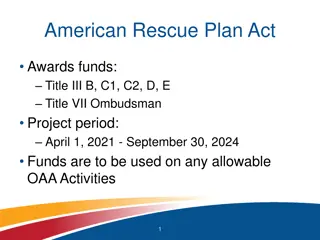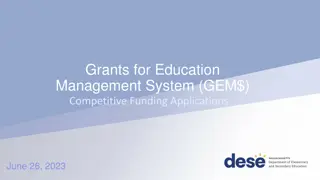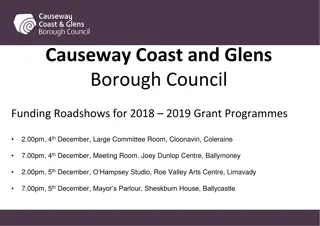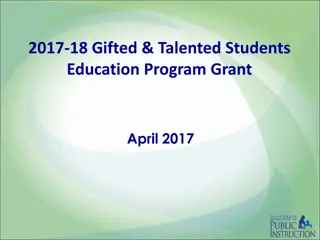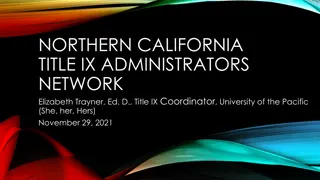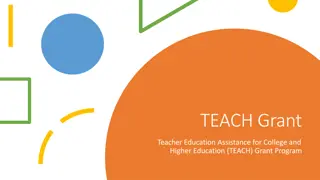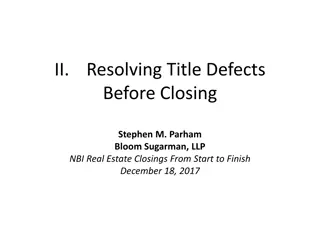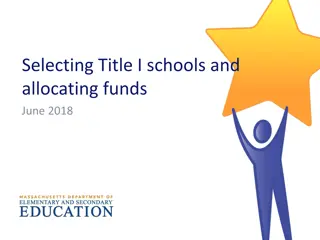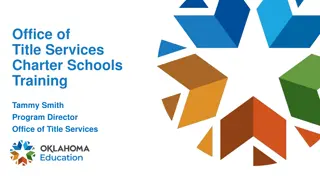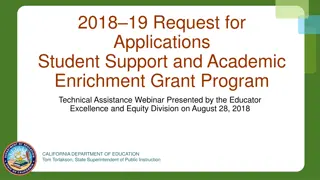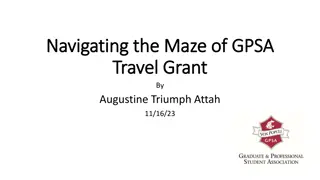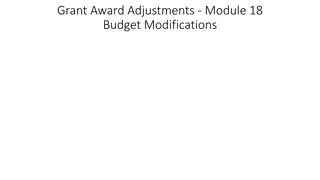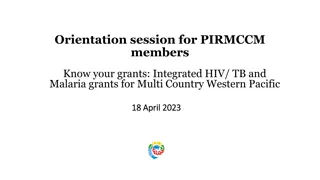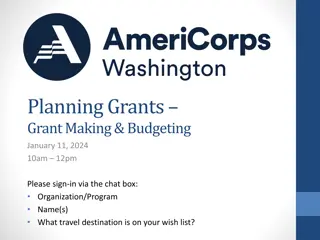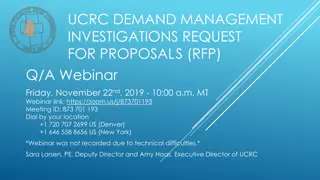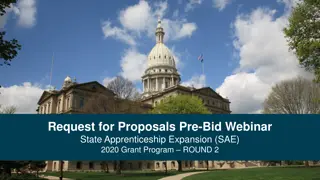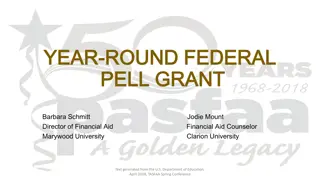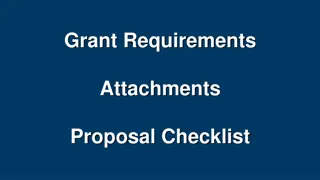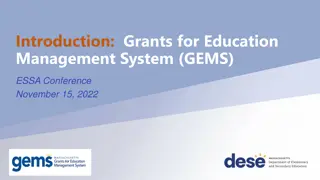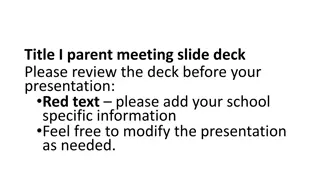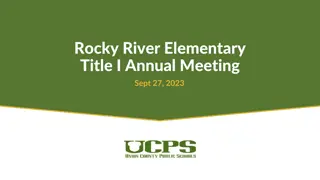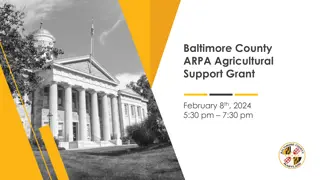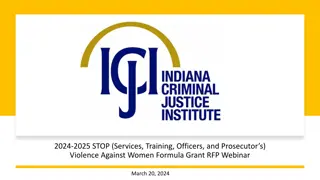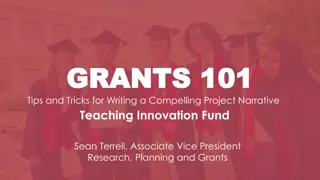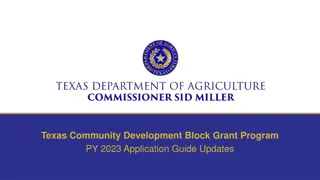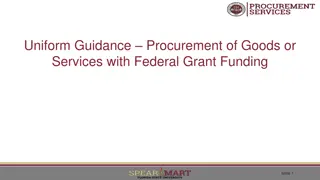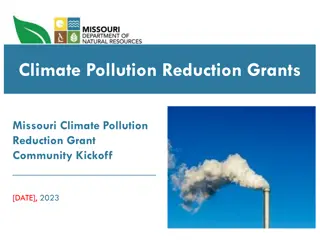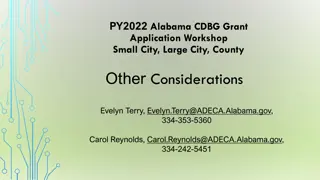Title VI Grant Requirements Overview
Explore the critical aspects of managing Title VI grants, including the end of MDD flexibility, application process, assurances, reporting requirements, and program administration. Stay informed to fulfill grant obligations effectively and maintain compliance.
Download Presentation

Please find below an Image/Link to download the presentation.
The content on the website is provided AS IS for your information and personal use only. It may not be sold, licensed, or shared on other websites without obtaining consent from the author. Download presentation by click this link. If you encounter any issues during the download, it is possible that the publisher has removed the file from their server.
E N D
Presentation Transcript
Title VI Grant Requirements September 2023 1
Remember the MDD has ENDED In May, 2023 the major disaster declaration (MDD) ended. This was the flexibility that allowed you to use Part A/B on caregiver services and Part C on nutrition and supportive services. With the end of this flexibility these funds should be kept separate! 2
YOUR Title VI Application Every program submitted a Title VI application during the fall of 2022. This is your contract with ACL. PLEASE make sure you have a copy of your application so you know what you need to do! 3
What is in your Title VI application? Your age of eligibility. Your service area. The requirements that are placed on every Title VI grant. This is your contract with ACL! 4
The Assurances in the Application (1) provide that the eligible tribal organization will evaluate the need for supportive and nutrition services among older individuals who are Indians to be represented by the tribal organizations; (2) provide for the use of such methods of administration as are necessary for the proper and efficient administration of the program to be assisted; 5
Quiz Time What does every Title VI program do during the application process to fulfill the first assurance? A. Completing and reviewing the needs assessment B. Completing the applications C. You do not fulfill the requirements doing the application cycle. D. Coming to the Title VI conference. 6
Assurances cont.: Reporting Requirements (3) provide that the tribal organization will make such reports in such form and containing such information, as the Assistant Secretary may reasonably require, and comply with such requirements as the Assistant Secretary may impose to assure the correctness of such reports; 7
Assurances cont.: Program Administration (4) provide for periodic evaluation of activities and projects carried out under the application; (5) establish objectives consistent with the purposes of this part toward which activities under the application will be directed, identify obstacles to the attainment of such objectives, and indicate the manner in which the tribal organization proposes to overcome such obstacles; (6) provide for establishing and maintaining information and assistance services to assure that older individuals who are Indians to be served by the assistance made available under this part will have reasonably convenient access to such services; (7) provide a preference for older individuals who are Indians for full or part-time staff positions whenever feasible; 8
Quiz Time How do you fulfill the reporting requirements? A. You send Cynthia an email B. You complete your PPR in OAAPS. C. You complete your Title VI application every 3 years. D. You complete your annual financial report in PMS. E. Both B and D. 9
Assurances cont.: Coordination with Title III (8) provide assistance that either directly or by way of grant or contract with appropriate entities nutrition services will be delivered to older individuals who are Indians represented by the tribal organization substantially in compliance with the provisions of part C of title III, except that in any case in which the need for nutritional services for older individuals who are Indians represented by the tribal organization is already met from other sources, the tribal organization may use the funds otherwise required to be expended under this paragraph for supportive services; (9) provide that any legal or ombudsman services made available to older individuals who are Indians represented by the tribal organization will be substantially in compliance with the provisions of title III relating to the furnishing of similar services; (11) contain assurances that the tribal organization will coordinate services provided under this part with services provided under title III in the same geographical area. 10
Tip Service Alignment in the OAA Service Title VI Title III Transportation Part A/B Part B Chore Part A/B Part B Information & Assistance Part A/B Part B Case Management Part A/B Part B Congregate Meals Part A/B Part C-1 Home Delivered Meals Part A/B Part C-2 Health Promotion/Disease Prevention Part A/B Part D Caregiver Support (Caregivers of Elders or people with dementia of any age) Caregiver Support (Older Relative Caregivers caring for children or adults with disabilities) Part C Part E Part C Part E
Tips for Title VI & Title III Coordination 1. Make referrals to Title III programs 2. Participate on State / AAA Advisory Council or Board 3. Ask State / AAA to do presentations to elders at Title VI site 4. Tell elders about presentations/events by the State / AAA 5. Send Title VI newsletter/emails to State / AAA 6. Ask to be on distribution list to get State / AAA newsletter/emails 7. Give input on State and Area Plans on Aging 8. Serve on other workgroups/committees of State / AAA 9. Consider collaborating with State / AAA on grant proposals (for example be a host site for falls prevention class) 10. Apply for Title III and other funding from State / AAA 12
Who can I contact with questions? ACL Regional Administrators Region (State) Regional Administrator Email Phone 1 (CT, ME, MA, RI) Jennifer Throwe Jennifer.throwe@acl.hhs.gov (617) 565-1158 2,3,4 (NY, AL, MS, NC, SC, VA) Rhonda Schwartz rhonda.schwartz@acl.hhs.gov (267) 831-2329 5 (MI, MN, WI) Lacey Boven lacey.boven@acl.hhs.gov (816) 702-4180 6 (LA, NM, OK, TX) Derek Lee derek.lee@acl.hhs.gov (214) 767-1865 7 (IA, KS, NE) Cynthia Brammeier cynthia.brammeier@acl.hhs.gov (816) 321-7341 8 (CO, MT, ND, SD, UT, WY) Percy Devine percy.devine@acl.hhs.gov (303) 844-7815 9 (AZ, CA, HI, NV) Fay Gordon Fay.Gordon@acl.hhs.gov (415) 437-8780 10 (AK, ID, OR, WA) Louise Ryan Louise.Ryan@acl.hhs.gov (206) 615-2299 13
Assurances cont.: Fiscal Controls (10) provide satisfactory assurance that fiscal control and fund accounting procedures will be adopted as may be necessary to assure proper disbursement of, and accounting for, Federal funds paid under this part to the tribal organization, including any funds paid by the tribal organization to a recipient of a grant or contract; 14
Some Part A/B Requirements in THE LAW 15
Part A/B Grants - Nutrition Services - REQUIRED Required Nutrition Services: Congregate Meals Home Delivered Meals Nutrition Education and Nutrition Counseling to be provided, as appropriate
Part A/B Grants Nutrition Services - PERMITTED Diet counseling Sponsorship of Farmers Market programs Distribution centers for food banks Blood Sugar checks Diabetes education Foot Care Blood Pressure Checks Evidence-based health programs Falls avoidance education Medication management Traditional foods activities Other traditional activities Support groups Socialization activities Exercise Classes 19
Part A/B Grants - Supportive Services - REQUIRED Information is a required service Simple provision of information to people; can be in a group session or one-on-one Maintain a list of all services that are available to older Indians in the service area Maintain a list of services needed or requested by the older Tribal members Assistance is required service Providing assistance to older tribal members to help them access assistance Be able to track the number of unduplicated persons who receive the service 20
Part A/B Grants - Supportive Services - PERMITTED A tribal organization may provide any of the supportive services mentioned under title III of the Older Americans Act, and any other supportive services that are necessary for the general welfare of older Indians (45 C.F.R. 1322.13 (a)) 21
Part A/B Grants - Supportive Services PERMITTED Examples Outreach Case Management Transportation Legal Assistance Homemaker Services Personal Care/Home Health Aide Chore Services Visiting Telephoning Health Promotion Activities Snow Removal Wood Chopping 22
Reminders About Part C Eligibility Part C caregiving grants are intended to serve informal family caregivers: Elder s sons/daughters Elder s neighbors Elder s spouses Elder s grandchildren The Elder themselves ***Note*** the caregiver does not have to live with the elder to get the services 24
Reminders About Part C Eligibility Remember the CAREGIVER should be the person receiving the service (like support groups). The idea is happy and healthy caregivers can better support the elders. The program should NOT pay for professional caregivers for elders that do not have a caregiver. 25
Reminders About Part C Services Did you know there are some Part C services that you are REQUIRED to provide? 26
Butwhat does this mean? Title III section 373 outlines services tribes must provide to caregivers: 1. Information to caregivers about available services. 2. Assistance to caregivers in gaining access to available services 3. Individual counseling for caregivers 4. Organization of support groups 5. Caregiver training 6. Respite care for caregivers 7. Supplemental services (on a limited basis) 27
Wowthats a lot!! The requirement is that the TRIBE make these services available to elders. So you can meet this requirement by referring caregivers to other departments in the tribe or coordinating with other departments to provide services (like counseling or respite). 28
ButSome Services Are in Part A/B and Part C??? Yes! Some services (like information and assistance and homemaker/chore) can be paid for out of Part A/B or Part C. Think about who is benefiting from/asking for the service. For example, if a daughter is asking for help cleaning her mom s house, that s Part C! 29
Reminders about funding The MDD ended in May 2023 so these grants should ONLY be used on caregiver services: FY22 Part C (20*OATC) (currently in an NCE) FY23 Part C (23*OATC) ARPA Part C (21*TCC6) 30
